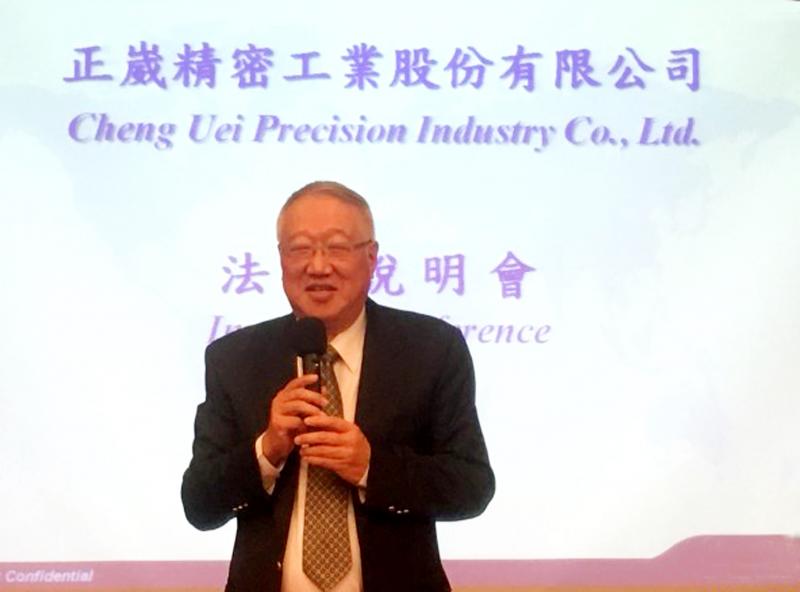Cheng Uei Precision Industry Co (正崴精密) on Friday announced that it had acquired 1.6 hectares of land in Phoenix, Arizona, as the cable and connector maker is planning to lease a factory and build a green-energy-related production base.
It would be Cheng Uei’s first manufacturing site in the US, the firm said in a statement.
Cheng Uei, headquartered in New Taipei City’s Tucheng District (土城), operates research-and-development and marketing bases in the US — in Los Angeles, San Jose and Seattle.

Photo: Chen Rou-chen, Taipei Times
Cheng Uei, also known as Foxlink, said it is planning to invest in green energy-related industries to produce charging stations, and battery assembly and energy storage equipment, among other products.
Cheng Uei spent US$17.22 million on the Phoenix plot, it added.
Since its establishment in 1986, the company has been supplying connectors, cable assemblies, power management devices and battery packs to some of the world’s leading makers of communications devices, computers and consumer electronics.
“Considering that energy conservation and carbon reduction have become an international consensus, the green energy industry has become one of the industries supported by various countries with a promising outlook,” the company said.
“Therefore, in addition to investing in Shinfox Energy Co (森崴能源) in Taiwan to provide comprehensive green energy services, Cheng Uei is planning a new production base and expanding its green energy-related business to the US market,” it said.
Cheng Uei said it is also planning to build charging stations and energy storage facilities in California for electric vehicles (EVs) and electric school buses.
The company is drafting plans to cooperate with US energy storage equipment manufacturers to establish a charging demonstration station in California, it said.
The demonstration facility would have a 180 kilowatt-hour (kWh) direct current fast-charging station and an energy storage facility with a capacity of 500kWh, the company said, adding that it expects growing demand for EVs and fast charging.
The Phoenix plant would provide comprehensive solutions for electric buses, charging stations and energy storage facilities on campus, which would enable electric buses to send electricity back to the grid by using vehicle-to-grid (V2G) technology, the company said.
V2G facilities reduce the need for additional charging stations and ease pressure on power companies, while creating a new source of income and a new business model.
Cheng Uei said it is eyeing cities with high electricity costs for marketing its green energy solutions.

CAUTIOUS RECOVERY: While the manufacturing sector returned to growth amid the US-China trade truce, firms remain wary as uncertainty clouds the outlook, the CIER said The local manufacturing sector returned to expansion last month, as the official purchasing managers’ index (PMI) rose 2.1 points to 51.0, driven by a temporary easing in US-China trade tensions, the Chung-Hua Institution for Economic Research (CIER, 中華經濟研究院) said yesterday. The PMI gauges the health of the manufacturing industry, with readings above 50 indicating expansion and those below 50 signaling contraction. “Firms are not as pessimistic as they were in April, but they remain far from optimistic,” CIER president Lien Hsien-ming (連賢明) said at a news conference. The full impact of US tariff decisions is unlikely to become clear until later this month

Popular vape brands such as Geek Bar might get more expensive in the US — if you can find them at all. Shipments of vapes from China to the US ground to a near halt last month from a year ago, official data showed, hit by US President Donald Trump’s tariffs and a crackdown on unauthorized e-cigarettes in the world’s biggest market for smoking alternatives. That includes Geek Bar, a brand of flavored vapes that is not authorized to sell in the US, but which had been widely available due to porous import controls. One retailer, who asked not to be named, because

CHIP DUTIES: TSMC said it voiced its concerns to Washington about tariffs, telling the US commerce department that it wants ‘fair treatment’ to protect its competitiveness Taiwan Semiconductor Manufacturing Co (TSMC, 台積電) yesterday reiterated robust business prospects for this year as strong artificial intelligence (AI) chip demand from Nvidia Corp and other customers would absorb the impacts of US tariffs. “The impact of tariffs would be indirect, as the custom tax is the importers’ responsibility, not the exporters,” TSMC chairman and chief executive officer C.C. Wei (魏哲家) said at the chipmaker’s annual shareholders’ meeting in Hsinchu City. TSMC’s business could be affected if people become reluctant to buy electronics due to inflated prices, Wei said. In addition, the chipmaker has voiced its concern to the US Department of Commerce

STILL LOADED: Last year’s richest person, Quanta Computer Inc chairman Barry Lam, dropped to second place despite an 8 percent increase in his wealth to US$12.6 billion Staff writer, with CNA Daniel Tsai (蔡明忠) and Richard Tsai (蔡明興), the brothers who run Fubon Group (富邦集團), topped the Forbes list of Taiwan’s 50 richest people this year, released on Wednesday in New York. The magazine said that a stronger New Taiwan dollar pushed the combined wealth of Taiwan’s 50 richest people up 13 percent, from US$174 billion to US$197 billion, with 36 of the people on the list seeing their wealth increase. That came as Taiwan’s economy grew 4.6 percent last year, its fastest pace in three years, driven by the strong performance of the semiconductor industry, the magazine said. The Tsai